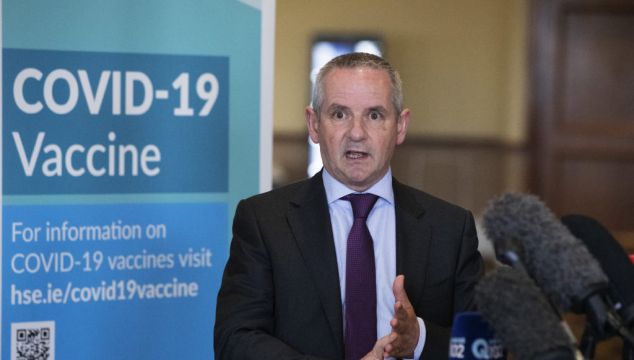The health system will face major pressures in the weeks ahead, the chief of the Health Service Executive (HSE) warned on Thursday.
At the first HSE briefing since August, Paul Reid said that rising Covid-19 cases, as well as the spread of flu and respiratory illnesses, was a cause for concern.
Health officials said Ireland was likely to face another difficult winter, with some hospitals already being forced to scale back scheduled treatment because of the latest surge of the virus.
On Tuesday, the Government said it would ease some Covid-19 restrictions, but a range of public health guidelines will remain in place until February 2022.
Mr Reid told reporters on Thursday that it was worrying that projections from the National Public Health Emergency Team (Nphet) estimated intensive care numbers could reach around 150 by the end of November.
More older people are getting sicker, more people are being hospitalised and indeed more people, by the day, are being put into ICU.
“The projections, communicated from Nphet earlier this week, have caused particular levels of concern to our ICU consultants,” Mr Reid told reporters.
Mr Reid said: “We know, and the hospital systems know, that they need extra support through the winter.”
He said that everyone could remember the huge pressure that had faced the health system in some of the previous phases of the pandemic, when vast numbers of operations and procedures were cancelled.
“Nobody wants to go back to a situation where we collapse all non-Covid care to cope with those numbers.”
“We would cope with the numbers, but it impacts then on other aspects of healthcare.”
There are 448 people in hospital at the moment with the virus, Mr Reid said.
Eighty-eight people (as of lunchtime) are in intensive care with Covid-19, taking up 30 per cent of intensive care capacity in the State.
Now 86 patients under intensive critical care with #Covid19. This represents almost 30% of ICU beds. This is likely to increase. None of us want to be that person. We can turn this around with heightened individual and collective awareness over the coming days & weeks. @HSELive
— Paul Reid (@paulreiddublin) October 21, 2021
Advertisement
Mr Reid said 52 per cent of those people in intensive care were not vaccinated, while 41 per cent were fully vaccinated. He said per cent were partially vaccinated.
Mr Reid said there was a “very significant disproportionate impact upon those who are not vaccinated entering into ICU”.
Figures released on Thursday by the HSE also revealed that there had been an 18 per cent increase in Covid-19 testing in the last week.
Positivity rates from testing carried out at community testing sites now sits at 11.8 per cent. In Kerry, that figure has reached as high as 19 per cent.
Niamh O’Beirne, head of testing and tracing in the HSE, said five weeks ago that figure was 6.8 per cent.
I've been working with @HSELive and welcome new guidance being published today that will ensure more open access for partners in our maternity hospitals and units. pic.twitter.com/h9LhNySXQj
— Stephen Donnelly (@DonnellyStephen) October 21, 2021
Earlier on Thursday, Tánaiste Leo Varadkar said “nobody can rule out” the reintroduction of pandemic restrictions.
Speaking on the fringes of an EU summit in Brussels, Mr Varadkar said: “The CMO (chief medical officer) was clear about that in his letter.”
Nphet gave its first briefing since late August on Wednesday as the number of cases, hospital admissions and deaths linked to the virus continues to grow.
At that briefing, health officials warned that mortality rates from Covid-19 are expected to rise in the coming weeks.
Damien McCallion, who leads the HSE’s vaccination programme, said people were still coming forward for vaccinations.
He said some people as old as 80 were still arriving for the jab, with 1,000 people a day coming forward over the last two weeks.
The HSE will run a campaign during Halloween to encourage certain groups where uptake has been low to take up the Covid-19 vaccine.
More than 92 per cent of people in the Republic are now fully vaccinated.
Booster vaccine
Vaccine boosters for people over the age of 60 were also approved by the National Immunisation Advisory Committee (Niac) this week.
Mr McCallion said the booster programme for that population would begin in the coming weeks, with around 800,000 people expected to be contacted for a third dose of the vaccine.
Mr Reid also confirmed that from November 1st, all maternity services would be significantly easing restrictions on visiting for partners.
The ongoing restrictions had been a cause of anger and concern for many expectant mothers and their families.

“Maternity services can provide access for nominated support partners to access inpatient areas during normal visiting hours of 8am to 8pm,” he said.
Minister for Health Stephen Donnelly said he welcomed the new guidance that would provide “open access for partners”.
Mr Reid thanked women and their partners for cooperating with the HSE “during this difficult and challenging time”.







